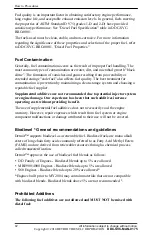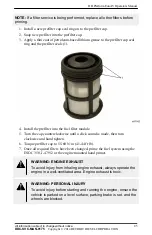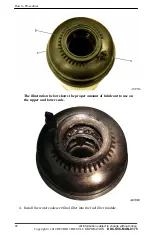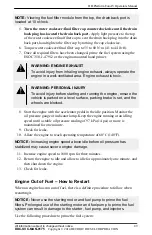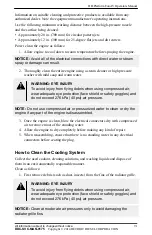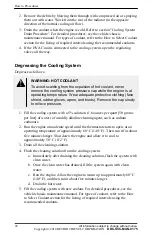
How to Select Coolant
This section covers selection of the required coolant for the engine.
Coolant Definitions
To help ensure complete understanding of the information, the definitions of the
following terms are listed in the following Table.
Table 5.
Coolant Terms
Term
Definition
Antifreeze
Ethylene Glycol containing a corrosion inhibitor package and which
meets an appropriate heavy-duty specification (i.e., TMC RP-329
Type A or ASTM Standard D6210 Type A for ethylene glycol).
Coolant
The fluid mixture circulating in the engine cooling system, typically a
mixture of 50% water and 50% antifreeze.
Drop–Out
Precipitated sludge or deposit formation on cooling system
components.
Fully Formulated
Antifreeze
Contains all the necessary inhibitors to protect a diesel engine, and
does not, therefore, require a pre-charge of Supplemental Coolant
Additive before its first use.
Initial–Fill Coolant
The coolant that is used in a new or rebuilt engine, or any time the
cooling system is emptied and then refilled with coolant.
OAT
Organic Acid Technology. An inhibitor system based on organic acid
inhibitors instead of traditional North American inhibitor formulations.
SCA
Supplemental Coolant Additive. Supplemental Coolant Additives are
used in a preventive maintenance program to prevent corrosion,
cavitation, and the formation of deposits.
Approved Coolants
Required specifications for water and ethylene glycol inhibitor packages and
inhibitor concentration are included in this section.
NOTICE:
To avoid engine damage from inadequate or over concentrated
coolant, the required specifications must be adhered to before the coolant is
replaced.
The approved and preferred coolants for the engine are listed in the following table.
DD Platform EuroIV Operators Manual
All information subject to change without notice.
93
DDC-SVC-MAN-0175
Copyright © 2014 DETROIT DIESEL CORPORATION




